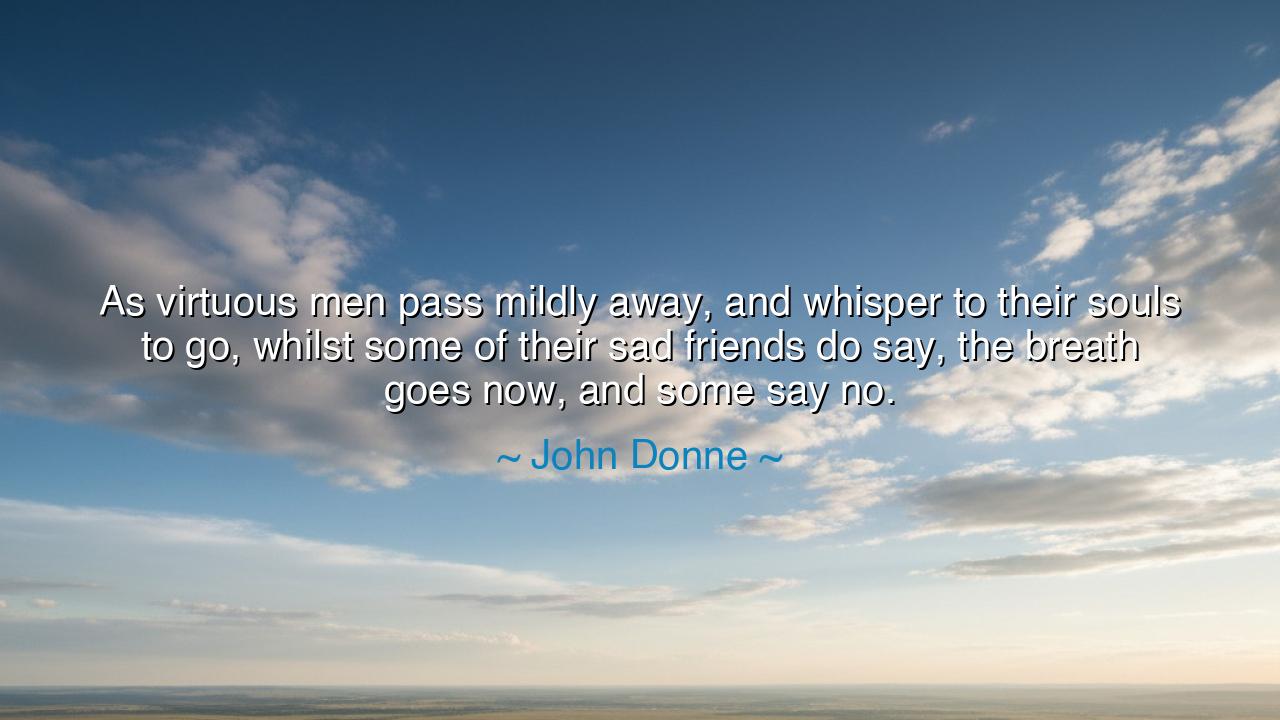
As virtuous men pass mildly away, and whisper to their souls to
As virtuous men pass mildly away, and whisper to their souls to go, whilst some of their sad friends do say, the breath goes now, and some say no.






Hear the words of John Donne, poet and preacher, who gazed into the mystery of death and spoke thus: “As virtuous men pass mildly away, and whisper to their souls to go, whilst some of their sad friends do say, the breath goes now, and some say no.” These lines, born of his poem A Valediction: Forbidding Mourning, are not only the song of farewell between lovers, but also a meditation on the quiet dignity of those who die in peace. In them, Donne captures the stillness of a departure so gentle that the living scarcely know the moment when the spirit has fled.
The heart of this saying lies in the contrast between the calmness of the virtuous and the confusion of the mourners. The soul, at rest with itself, does not rage against its leaving but accepts its summons as though it were a natural homecoming. Those who stand beside the deathbed, however, see only shadows and silence, and in their grief, they grasp to measure the exact instant of the last breath. But the dying are beyond such measurements. To them, death is not a shattering but a whisper, not a violent rupture but a quiet release.
This vision reflects Donne’s profound faith. To him, the virtuous man—secure in righteousness and in the love of God—has no terror in death. Such a man departs “mildly,” as if falling asleep, knowing that death is but a passage. The friends, bound by earthly sorrow, cannot see this truth; they wrestle with uncertainty, asking, “Now?” or “Not yet?” For them, the moment is unbearable. For the soul at peace, it is liberation. Thus Donne reminds us that perspective changes everything: what is sorrow to the living is serenity to the departing.
History gives us many who died in this manner. Recall Marcus Aurelius, emperor and philosopher, who on his deathbed urged his friends not to weep, for death is but a return to the universe from which all things come. He faced the end as a calm surrender, not a violent struggle, whispering to his soul as Donne’s virtuous men do. Or consider St. Francis of Assisi, who welcomed “Sister Death” with joy, singing in his final hours. Their departures, like Donne’s vision, were not marked by despair but by a strange and luminous peace.
The sad friends, however, represent us all—the living, who cannot comprehend the stillness of death. To us, the absence of breath feels like a theft, like a cruel silence. We peer at the body, asking if the spirit yet lingers, but we cannot grasp the mystery. Donne teaches that this uncertainty is not the fault of our eyes but the nature of mortality itself: death is a passage invisible to those who remain. It is for the living to mourn, but for the dying, it may be only a whisper of release.
What lesson, then, must we take from this? That we should live in such a way that our own departure may be mild. To cultivate virtue is not merely to live rightly, but also to die peacefully. If our conscience is at rest, our spirit need not fear its release. Death comes to all, but not all face it alike: the unprepared tremble, while the virtuous are serene. The difference lies not in the hour of death but in the life that preceded it.
Practical wisdom beckons: live each day with integrity, so that regret does not cling to your final hours. Reconcile with those you love, for unresolved anger makes death heavy. Seek meaning beyond wealth and fame, for these cannot comfort the soul when breath begins to fade. And when others pass, honor them not with frantic despair, but with reverence, trusting that their whisper was not into the void but into eternity.
Thus, let Donne’s words endure as a guide: “As virtuous men pass mildly away…” May we all strive to live so virtuously that, when our souls are called, we too may whisper gently to them to go, leaving behind not chaos but calm, not terror but peace. And may we, as friends of the dying, learn to see their serenity, so that even in loss, we recognize the quiet triumph of a life well-lived.






AAdministratorAdministrator
Welcome, honored guests. Please leave a comment, we will respond soon